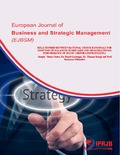RELATIONSHIP BETWEEN RATIONAL CHOICE RATIONALE FOR ADOPTION OF BALANCED SCORECARD AND ORGANIZATIONAL PERFORMANCE OF STATE CORPORATIONS IN KENYA

View/
Date
2018Author
Osewe, Joseph Ouma
Gachunga, Hazel
Senaji, Thomas
Otieno, Romanus Odhiambo
Metadata
Show full item recordAbstract
Purpose: The purpose of this study was to determine the relationship between rational choice rationale for balanced scorecard (BSC) adoption and organizational performance of state corporations in Kenya. Methodology: The research design employed in this study was explanatory cross-sectional survey research design. The target population for this study was the 32 State Corporations that have implemented balanced scorecard. A sample size of 96 top and senior middle level managers
comprising of Managing Directors, Human Resource Directors, Finance Directors, Operations Directors, or their equivalent designations in senior management were surveyed using semistructured questionnaires. The research adopted a quantitative approach. Findings: The findings indicated that rational choice is a good predictor of organizational performance of State Corporations in Kenya. The findings also showed that rational choice and organizational performance had a positive and significant relationship. Unique Contribution to Theory, Practice and Policy: In line with the findings, it is recommended that organizational decision makers to take account of available information, potential costs and benefits in determining whether to adopt or not adopt balanced scorecard, and to be lucid in choosing the best choice of action.
